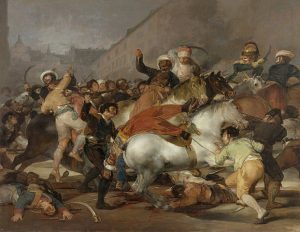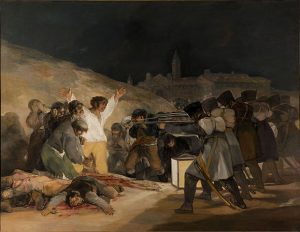Word With A Past: Guerrilla Warfare
Guerrilla tactics are probably as ancient as war itself. The word itself dates from the Napoleonic wars, a product of the Peninsular War of 1808-14 in Spain—the most prolonged and, with the exception of Napoleon’s invasion of Russia, most destructive campaign of the period.
Napoleon’s invasion of Spain had its official roots in long-simmering tensions between King Carlos IV of Spain and his son Ferdinand. (Though it’s hard to believe that Napoleon wouldn’t have invaded eventually even without an excuse.) Fearful that his father intended to remove him from the succession, Ferdinand asked for help from Napoleon in deposing his father.*
Carlos IV and his wife were not popular with their subjects. In March 1808, a popular uprising forced Carlos to abdicate in favor of Ferdinand. The new king arrived in Madrid on March 24, one day after the French commander Joachim Murat entered the city at the head of the French army. Popular feeling against Carlos IV’s corrupt government was so strong that many Spaniards greeted the French as liberators.
By the end of April, it was clear that the French had come to conquer Spain, not to liberate it. Both Carlos and Ferdinand, held captive in the French city of Bayonne, abdicated. By the time Napoleon named his brother Joseph the king of Spain on May 10, the country had already risen in rebellion.
- Francico Goya. The Second of May
- Francisco Goya. The Thrid of May
On May 2, rumors began to spread that the French planned to forcibly remove the remaining members of the royal family to Bayonne. Violent protests erupted in Madrid. A Mamluke cavalry unit, a souvenir of Napoleon’s invasion of Egypt,** charged the protesting crowd, which was armed with little more than cudgels and knives.*** Once the protestors were dispersed, Murat’s men rounded up everyone they could find who was armed. Executions lasted through the night and well into the morning.
The brutal repression of the May 2 protest fueled Spanish resistance. For six years, Spanish patriots, men and women alike, fought against the French occupiers in small irregular bands and provided critical support to the British Army in the Peninsular War against France. They were termed guerrillas—a diminutive of the Spanish word for war, guerra.
Guerrilla warfare: a little war, often pursued with big aims.
*This should be filed in the Big History Binder labeled "what were they thinking???"
**More useful than a t-shirt or a scale-model of the Pyramids.
***Unfortunately, variations on this show up more in history with some regularity. And not just in the distant past. Or in other countries.
Shoot Like A Girl Is A Compliment
As anyone who's been hanging out here in the Margins knows, I'm working on a global history of women warriors. I'm looking at examples from across the globe, from the ancient world through the twentieth century. Looking at their stories in the context of women in the modern American military--or maybe looking at women in the modern American military in the context of their stories--is an important part of what I'm doing.*
Shoot Like A Girl: One Woman's Dramatic Fight in Afghanistan and On the Home Front tells an important modern story. 
In 2012, former Air National Guard pilot and Purple Heart recipient Mary Jennings Hegar joined forces with the ACLU to successfully challenge the ban that kept American women out of ground combat units. In Shoot Like A Girl, Hegar tells the story of the career that led her to that point.
Hegar's love for flying, her commitment to her job, and her bonds with teammates are vivid on every page. The incident for which she received the Purple Heart--when her helicopter was shot down in Afghanistan with wounded men aboard—is a gripping story, told with skill. But the heart of the book is the institutional and individual sexism that Hegar had to overcome at every stage of her career.
Writing in a matter-of-fact, conversational style, Hegar recounts acts of casual prejudice that will feel familiar to any woman who has worked in a male-dominated field, hazing by hostile teammates and one horrifying instance of sexual assault by an army doctor during an exam, made worse by fact that his superiors took immediate action to protect him from punishment. Hegar shares feelings of betrayal, isolation, and anger. She admits to tears on more than one occasion. But her strongest response is a desire to prove that everyone who told her women shouldn't be military pilots was wrong. She succeeds.
Shoot Like a Girl made me cry, swear, laugh, cheer, and occasionally slam the book shut and walk away.
*"Why now?" is one of the questions you need to answer when you try to sell a non-fiction book to a publisher.
Most of this review previously appeared in Shelf Awareness for Readers.
A Love Letter to Independent Bookstores
I've never seldom, met a bookstore (or book-selling venue) I didn't like. I will happily browse through a big box store, a used bookstore, or the odd shelf of books in a flea market stall. In a strange town or foreign city, a bookstore visit will always make me happy, even if most of the books are in a language I can't read. I've never come away from a library sale without an armload, or in the case of the Hyde Park-Kenwood Community Conference annual book sale, several canvas bags full.* But independent book stores have a special place in my heart.
Heritage Books in Springfield, Missouri, was my first bookstore crush. It was a small store in a strip mall within walking of my house. In retrospect I realize that the selection was both small and eccentric, but at the time it seemed as bounteous as the Strand Bookstore in New York, which boasts eighteen miles of books. In some ways both the smallness and the eccentricity were to my benefit as a novice book buyer. On those rare occasions when I had some money to spend on a book, I gave in to the delights of serendipity, finding books I didn't know existed.
Today I live in Chicago, which is home to fabulous independent bookstores. Once again, I'm lucky enough to live within walking distance of my favorite stores: the very academic Seminary Coop Bookstore and its more commercial sibling, 57th Street Books. I browse. I chat about books with booksellers. I eavesdrop on the bookish conversation of others. I check to see if my own books are on the shelves. I check to see if my friends' books are on the shelves. I attend an occasional reading when the stars are in alignment. I resist the temptation to buy books I don't need, because at this point I already own several hundred books I have not yet read. And I give in to the temptation to buy more books because with bookstores it's a case of use them or lose them.
In the United States, the last Saturday of April is Independent Bookstore Day--a nationwide party for book lovers. (If you're reading this the day it comes out, that's tomorrow.) If you're lucky enough to have an independent bookstore near you, stop by and show them some love. Me? I'll be heading to 57th Street Books and the Seminary Coop with a wish list and an eye for a serendipitous find.
*Held each year on the weekend around Columbus Day. It's a dangerous event. See you there?


